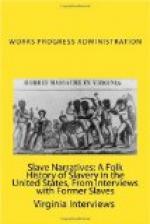The Writers’ Unit of the Library of Congress Project processes material left over from or not needed for publication by the state Writers’ Projects. On file in the Washington office in August, 1939, was a large body of slave narratives, photographs of former slaves, interviews with white informants regarding slavery, transcripts of laws, advertisements, records of sale, transfer, and manumission of slaves, and other documents. As unpublished manuscripts of the Federal Writers’ Project these records passed into the hands of the Library of Congress Project for processing; and from them has been assembled the present collection of some two thousand narratives from the following seventeen states: Alabama, Arkansas, Florida, Georgia, Indiana, Kansas, Kentucky, Maryland, Mississippi, Missouri, North Carolina, Ohio, Oklahoma, South Carolina, Tennessee, Texas, and Virginia[1].
[Footnote 1: The bulk of the Virginia narratives is still in the state office. Excerpts from these are included in The Negro in Virginia, compiled by Workers of the Writers’ Program of the Work Projects Administration in the State of Virginia, Sponsored by the Hampton Institute, Hastings House, Publishers, New York, 1940. Other slave narratives are published in Drums and Shadows, Survival Studies among the Georgia Coastal Negroes, Savannah Unit, Georgia Writers’ Project, Work Projects Administration, University of Georgia Press, 1940. A composite article, “Slaves,” based on excerpts from three interviews, was contributed by Elizabeth Lomax to the American Stuff issue of Direction, Vol. 1, No. 3, 1935.]
The work of the Writers’ Unit in preparing the narratives for deposit in the Library of Congress consisted principally of arranging the manuscripts and photographs by states and alphabetically by informants within the states, listing the informants and illustrations, and collating the contents in seventeen volumes divided into thirty-three parts. The following material has been omitted: Most of the interviews with informants born too late to remember anything of significance regarding slavery or concerned chiefly with folklore; a few negligible fragments and unidentified manuscripts; a group of Tennessee interviews showing evidence of plagiarism; and the supplementary material gathered in connection with the narratives. In the course of the preparation of these volumes, the Writers’ Unit compiled data for an essay on the narratives and partially completed an index and a glossary. Enough additional material is being received from the state Writers’ Projects, as part of their surplus, to make a supplement, which, it is hoped, will contain several states not here represented, such as Louisiana.
All editing had previously been done in the states or the Washington office. Some of the pencilled comments have been identified as those of John A. Lomax and Alan Lomax, who also read the manuscripts. In a few cases, two drafts or versions of the same interview have been included for comparison of interesting variations or alterations.




